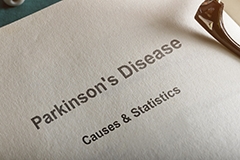Parkinson’s 10 Early Warning Signs
Medically Reviewed by Deborah L. Kirby, MD
Trembling in hands, legs and face combined with stiffness and slowness of movement, leading to poor balance and coordination. These signs may mark the beginning of Parkinson’s Disease, caused when nerve cells in the brain fail to produce enough of the chemical dopamine. Symptoms may worsen into sleep problems and trouble swallowing but a variety of medicines can radically reduce the symptoms.
Parkinson’s usually begins around the age of 60, more commonly found in men than women. Unfortunately, there’s no test a physician can perform. So, it’s often up to the individual to spot symptoms and ask your primary care physician to refer you to a Neurologist.
The Parkinson’s Foundation offers 10 early warning signs, designed to help someone recognize the potential of Parkinson’s onset.
1. Tremor (slight shaking) of the finger, thumb, hand or chin while at rest is a common early sign. Shaking can also be normal after excessive exercise, from stress, with injuries, or certain medications.
2. Small Handwriting may indicate the way you write has changed, for example the words are smaller and crowded together. Your writing can also change as you get older if you have stiff hands or fingers, or poor vision.
3. Trouble Smelling strong odors — such as bananas, dill pickles and licorice — can be a concern when discussing Parkinson’s. You can also lose your sense of smell due to cold, flu, or a stuffy nose, but it should return as your symptoms improve.
4. Trouble Sleeping, accompanied by complaints from your spouse on you thrashing around in bed during sleep it may be a sign of Parkinson’s. Everyone has a night they “toss and turn” instead of sleeping. But for Parkinson’s the thrashing tends to occur when they are in a deep sleep.
5. Body Stiffness in the arms, or legs that does not go away with movement can be a sign of Parkinson’s. An individual may also have stiffness or pain in their shoulder or hips. Patients who have injured their arm or shoulder will feel stiffness until the injury is healed. Arthritis may also cause this same symptom.
6. Constipation can have many causes but Parkinson’s Disease can mean trouble moving your bowels without straining every day.
7. Changes in your voice, where other people tell you your voice is very soft or you sound hoarse, can be a sign. Coughs or colds can cause the same sound but, again, your voice should return to normal once you are well.
8. Facial Masking is a serious, depressed or mad look on your face, even when you are not in a bad mood.
9. Dizziness or Fainting, when you stand up out of a chair can be a sign of low blood pressure, linked to Parkinson’s. Dizziness happens to everyone from time to time but if it is on a regular basis you should see your physician.
10. Stooping or Hunching Over, when standing, can be a sign of Parkinson’s.
ACTION YOU CAN TAKE
Having one sign is not a cause of concern but two or more signs should result in a discussion with your primary care physician. Normally, a referral from your physician to a neurologist is required.
For convenience, you can find a Neurologist near you.
Additional Resources: National Institutes of Health, U.S. National Library of Medicine
-
McLEOD REGIONAL MEDICAL CENTER FLORENCE
843-777-2000 -
McLEOD DARLINGTON
843-777-1100 -
McLEOD DILLON
843-774-4111 -
McLEOD LORIS
843-716-7000 -
McLEOD SEACOAST
843-390-8100 -
McLEOD CHERAW
843-537-7881 -
McLEOD CLARENDON
803-433-3000



-
McLEOD REGIONAL MEDICAL CENTER FLORENCE
843-777-2000 -
McLEOD DARLINGTON
843-777-1100 -
McLEOD DILLON
843-774-4111 -
McLEOD LORIS
843-716-7000 -
McLEOD SEACOAST
843-390-8100 -
McLEOD CHERAW
843-537-7881 -
McLEOD CLARENDON
803-433-3000
 Find a Doctor
Find a Doctor  Locations
Locations  Services
Services 